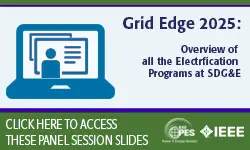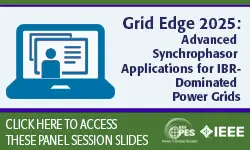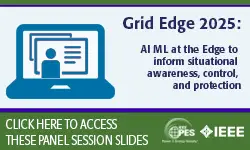REPORT ON COORDINATION OF GRID CODES AND GENERATOR STANDARDS: Consequences of Diverse Grid Code Requirements on Synchronous Machine Design and Standards
Evert Agneholm, William Bloethe, Edson Bortoni, Kevin Chan, Kay Chen, Bob Cummings, Robert F. Gray, Randall Groves, Les Hajagos, Joe Hurley, Relu Ilie, Chavdar Ivanov, Ana Joswig, Jason Kapelina, Ruediger Kutzner, Jim Lau, Kevin Mayor, Bill Moore, Lon Montgomery, Nils Nilsson, Ryan Quint, Steve Richards, Michel Rioual, Luis Rouco, Mike Sedlak, Uwe Seeger, Nico Smit, Fabian Streiff, Robert Thornton-Jones, John Yagielski, Marc Zeidman, Carsten Zuehlke
-
Members: FreePES
IEEE Members: $45.00
Non-members: $70.00Pages/Slides: 88
09 Feb 2019
In recent years energy transitions are occurring worldwide whereby large-scale integration of renewable energy sources into the electrical supply system is occurring to combat global CO2 emissions. This has resulted in grid operators specifying more stringent requirements, as well as flexibility requirements, for generating equipment, to safeguard power network operational integrity and stability. This has caused significant concerns for owners and manufacturers of generators and for those responsible for specifying generators and excitation systems. To avoid serious financial consequences these stakeholders need to take special care to ensure that equipment will be grid code compliant. The IEEE PES Electrical Machinery Committee constituted a task force to review worldwide grid codes and report on these issues. The resulting report covers the following key subject areas: 1. Current changes in electrical supply networks related to generation mix and introduction of new technologies impacting system parameters, operational procedures and the increased risks of system disturbances and interactions on control systems. 2. Issues related to the different aspects of generator capability envelope as specified in the technical standards and design challenges to accommodate current and future grid code requirements faced by equipment manufacturers. 3. The impact of system fault related requirements on generator design and standards 4. The impact of grid code requirements on the generator excitation system and the related equipment standards. 5. The influence of current grid code requirements and the tendency of system operators to apply flexible operation regimes to existing generators.
Chairs:
Robert Thornton-Jones
Primary Committee:
IEEE PES Electrical Machinery Committee Task Force on Grid Code Impacts on Generator Standards


